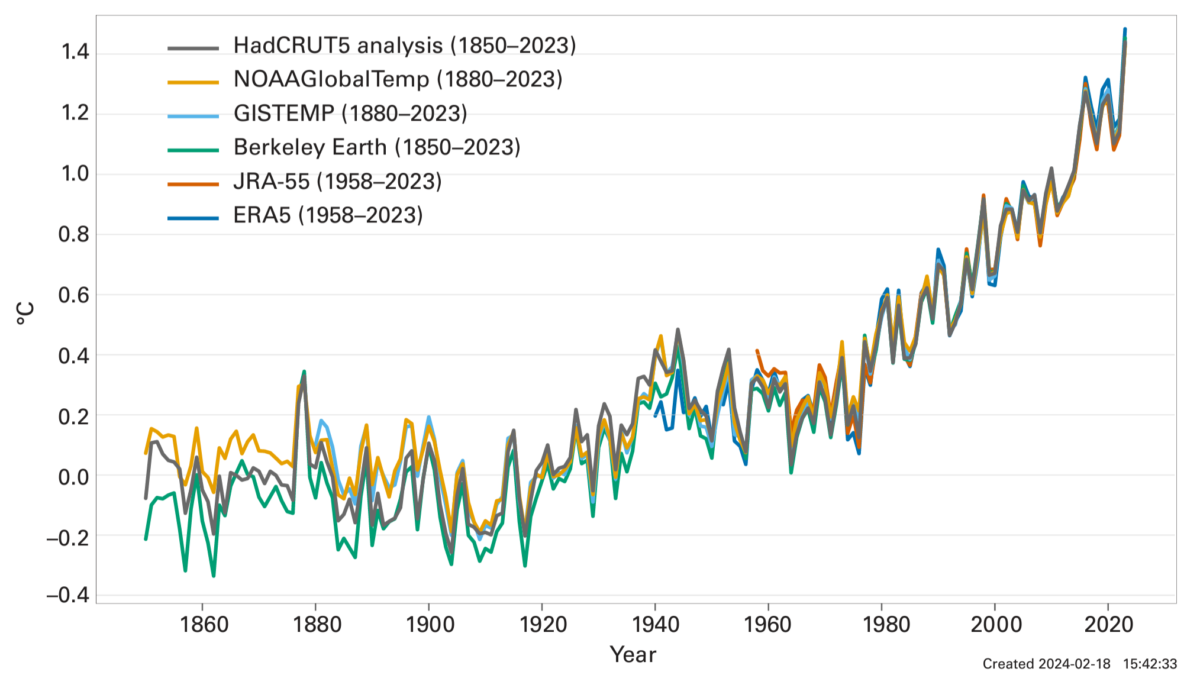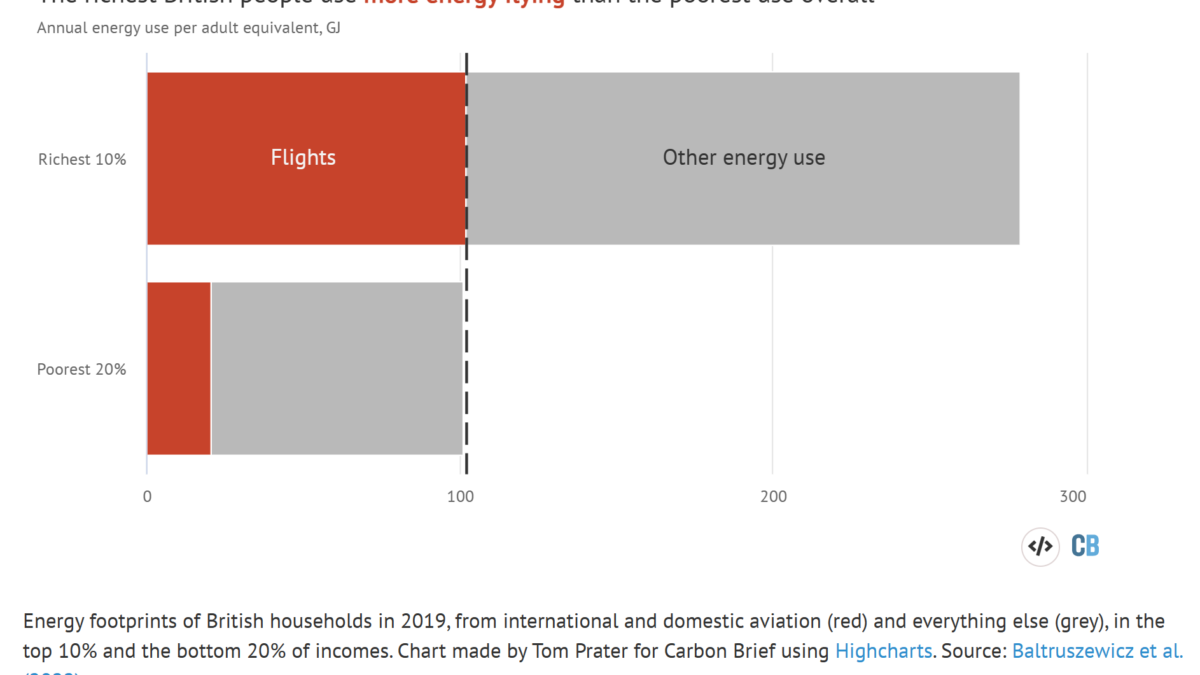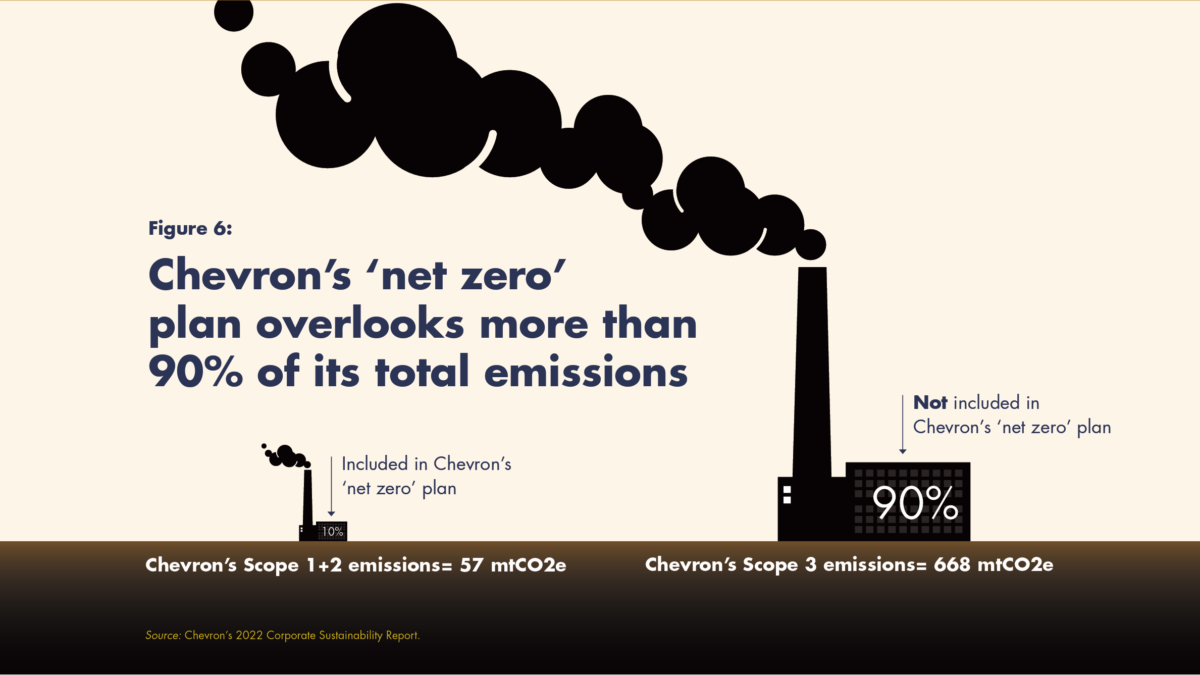EIU Democracy Index reached all-time low in 2021 – Fewer than half (45.7 percent) of the world’s people now live in a democracy of some sort – “Another bad year for democracy”
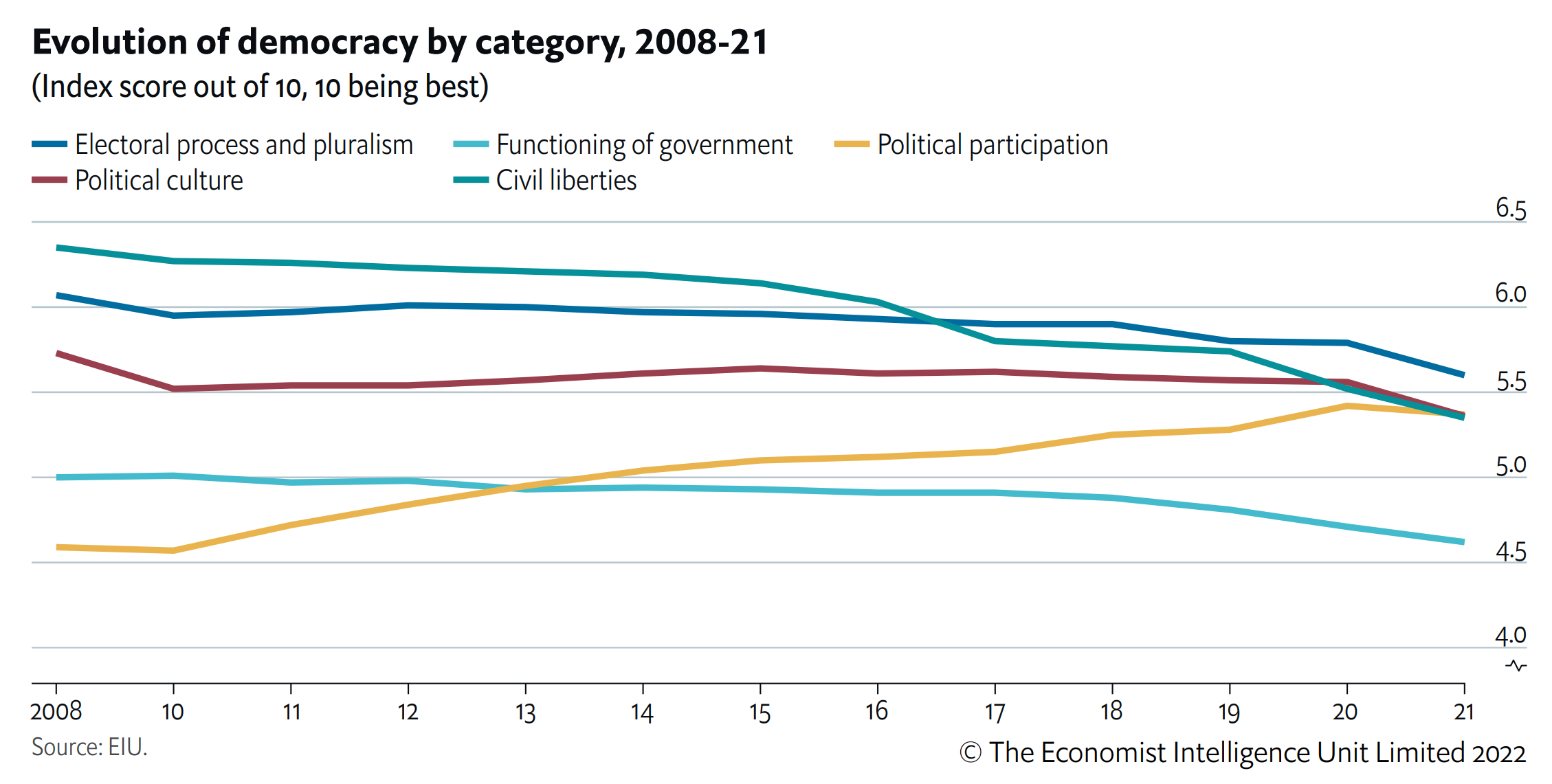
By Chauncey Devega
2 May 2022
(Salon) – Global democracy is sick. In the United States, Donald Trump’s supporters in the Republican Party continue to steamroll the Democrats and other pro-democracy forces. To say that the latter have for the most part been hapless, uncoordinated and paralyzed by denial is not overstating the case.
Political scientists and other experts have warned that in the wake of the Trump presidency and the coup attempt of January 2021, the country is now an “anocracy,” hovering in limbo between naked authoritarianism and a slowly failing democracy.
As I have repeatedly warned this is an existential struggle: If the Republicans and the larger white right achieve their goals the United States will become a living nightmare for anyone who is not a rich white “Christian” heterosexual male, or otherwise deemed to be a “real American” and one of the MAGA-elect Trump cultists.
Writing at the Financial Times, columnist Martin Wolf describes this moment of peril and impending disaster:
“An American ‘Caesarism’ has now become flesh.” I wrote this in March 2016, even before Donald Trump had become the Republican nominee for the presidency. Today, the transformation of the democratic republic into an autocracy has advanced. By 2024, it might be irreversible. If this does indeed happen, it will change almost everything in the world. …
Thus, health permitting, Trump will be the next Republican candidate. He will be backed by a party that is now his tool. Most important, in the words of David Frum, erstwhile speechwriter for George W Bush, “what the United States did not have before 2020 was a large national movement willing to justify mob violence to claim political power. Now it does.” It does so because its members believe their opponents are not “real” Americans. A liberal democracy cannot long endure if a major party believes defeat is illegitimate and must be rendered impossible.
Political scientist Thomas Homer-Dixon echoed these concerns in a widely read essay last December in the Globe and Mail, warning that American democracy could collapse by 2025, “causing extreme domestic political instability, including widespread civil violence, and that by 2030, “if not sooner, the country could be governed by a right-wing dictatorship”:
We mustn’t dismiss these possibilities just because they seem ludicrous or too horrible to imagine. In 2014, the suggestion that Donald Trump would become president would also have struck nearly everyone as absurd. But today we live in a world where the absurd regularly becomes real and the horrible commonplace.
Leading American academics are now actively addressing the prospect of a fatal weakening of U.S. democracy…. Once Republicans control Congress, Democrats will lose control of the national political agenda, giving Mr. Trump a clear shot at recapturing the presidency in 2024. And once in office, he will have only two objectives: vindication and vengeance.
In the shadow of such darkness, we must not surrender to despair. That is how the global right and the fascist movement wins. Instead, those who believe in true social democracy and the liberal democratic project must stare unflinchingly into the darkness, exile the hope-peddlers and naïve optimists who believe that compromise with such evil is possible, critically assess the reality of the crisis, and then organize and rally to victory. […]
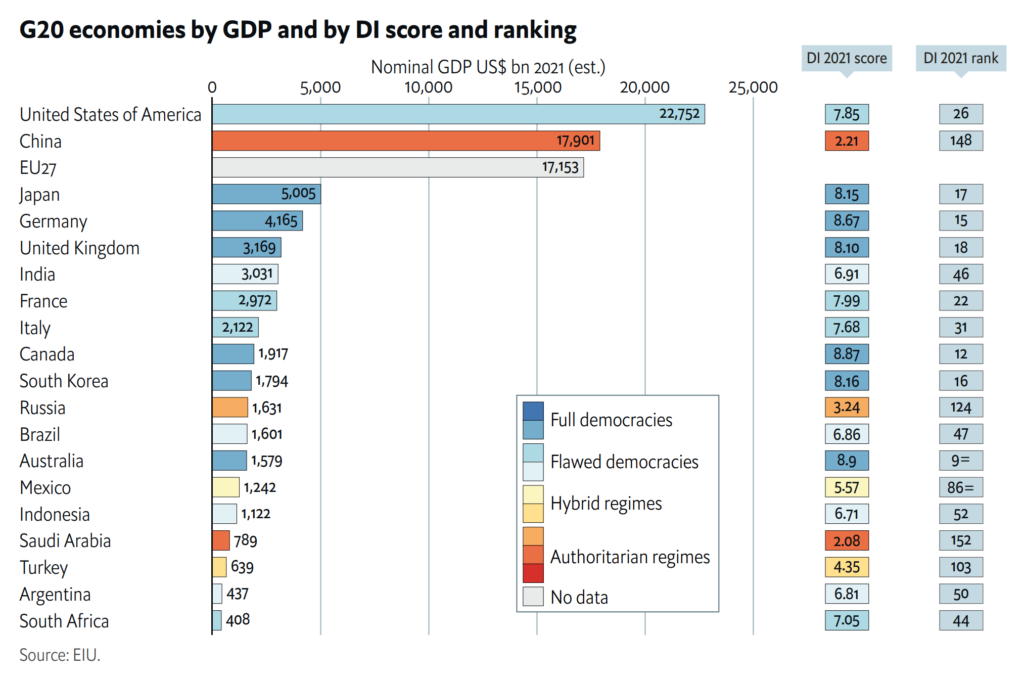
What do we know and where do we go from here? In an effort to answer these questions, I recently spoke with Andrew Viteritti, a senior member of the global forecasting team at the Economist Intelligence Unit, about its recent report, Democracy Index 2021: the China Challenge.
In this conversation, Viteritti explains the unit’s findings that how global democracy has fallen to its lowest levels since the Economist began tracking it in 2006. He also reports that in many “advanced” or “mature” democracies there is growing cynicism and distrust of government and its ability to solve problems such as price inflation or the COVID pandemic, and that those sentiments are being exploited by illiberal and other anti-democracy forces. Viteritti also discusses the challenge that China’s “state capitalism” model represents for global democracy, and what Donald Trump’s coup attempt of 2021 and related events tell us about extreme partisan political polarization and how it has imperiled the basic functions of government. […]
How are you feeling about democracy and the overall state of the world, as it faces so many political and other crises?
The most recent edition of the Democracy Index shows that we’ve seen another bad year for democracy. The average global score has continued to decline. It is now at an all-time low by our measurements, 5.28 out of a scale of 10. That is a bigger decline than what we saw even in our previous studies, in the 2020 study, which is remarkable when you consider that was the year when the coronavirus pandemic hit. That had many implications for the state of democratic institutions, and also public perceptions towards government. [more]
Global forecaster on “another bad year for democracy”: Is the world near a dire tipping point?
Democracy Index 2021: less than half the world lives in a democracy
10 February 2022 (EIU) – The 2021 edition of the EIU’s Democracy Index sheds light on continued challenges to democracy worldwide, under pressure from the coronavirus pandemic and increasing support for authoritarian alternatives.
The annual democracy index, which provides a measurement of the state of global democracy, reveals an overall score of 5.28, down from 5.37 in 2020. This fall is the biggest since 2010, in the immediate aftermath of the global financial crisis, and sets another dismal record for the worst global score since the world democracy index was first produced in 2006.
In EIU’s democracy index countries are grouped into four types of regimes, based on their average score: full democracy, flawed democracy, hybrid regime, and authoritarian regime.
According to EIU’s measure of democracy, less than half (45.7%) of the world’s population now live in a democracy of some sort, which is a significant decline from 2020 (49.4%). Even fewer (6.4%) reside in a “full democracy”; this level is slightly down from 8.4% in 2020, after two countries (Chile and Spain) were downgraded to “flawed democracies”. Substantially more than a third of the world’s population (37.1%) live under authoritarian rule, a large share of which are in China.
There were 13 changes of regime type in 2021’s democracy index—nine negative and four positive. Chile and Spain were downgraded from “full democracies” to “flawed democracies”. Three east European countries—Moldova, Montenegro, and North Macedonia—improved their status from “hybrid regimes” to “flawed democracies”. Ecuador, Mexico, Paraguay and Tunisia were all relegated from “flawed democracies” to “hybrid regimes”. Mauritania was promoted from the “authoritarian regime” classification to that of “hybrid regime”. The Kyrgyz Republic slipped eight places and was demoted from a “hybrid regime” to an “authoritarian regime”. Haiti followed the same path, as did Lebanon.
The majority of countries registered a deterioration in their average score or stagnated in 2021, with only 47 (28.1%) of a total of 167 recording an improvement in their democracy ratings. About 74 (44.3%) recorded a decline in their total score compared with 2020’s world democracy index. The other 46 (27.5%) stagnated, with their democracy ratings remaining unchanged from 2020. There were a few improvements and some dramatic declines, with Moldova and Indonesia registering the biggest improvements, measured by the change in their overall scores, and Afghanistan, Myanmar and Tunisia the biggest declines. A large number of Latin American countries recorded steep falls in their overall scores.
Alongside the global democracy rankings table, a regional wrap-up and a look at the key country movers, this edition of the Democracy Index also asks the question: how much of a challenge does China’s political model pose globally?
Download the full report, Democracy Index 2021, to view the list of countries by democracy index.
Democracy Index 2021: less than half the world lives in a democracy

